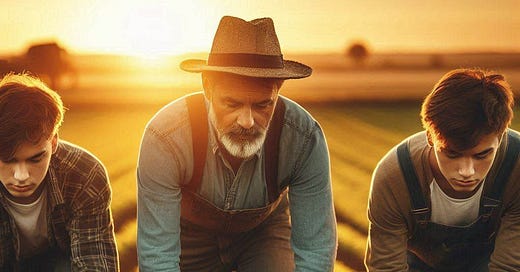About Time, Session 7: Dare to Be Ordinary
Giving up on the unattainable goal of eradicating all our problems.
In his essay “Farming,” Ralph Waldo Emerson explores how the farmer learns patience:
He bends to the order of the seasons, the weather, the soils and crops, as the sails of a ship bend to the wind. He represents continuous hard labor, year in, year out, and small gains. He is a slow person, timed to Nature, and not to city watches. He takes the pace of seasons, plants and chemistry. Nature never hurries: atom by atom, little by little, she achieves her work.
Patience is a virtue that farmers learn. Emerson explains, “The farmer times himself to Nature, and acquires that livelong patience which belongs to her.”
We've been visiting a local farm weekly for almost thirty summers, getting to know the farmer and his kids. They don't complain about the weather. If it is hot, they get up earlier. If an unexpected late frost damages their crop, they plant again.
Of course, patience can be acquired via any activity. I know it can be acquired through writing, teaching, hiking, parenting, or the ordinary demands of life. Oliver Burkeman writes,
In a world geared for hurry, the capacity to resist the urge to hurry—to allow things to take the time they take—is a way to gain purchase on the world, to do the work that counts, and to derive satisfaction from the doing itself, instead of deferring all your fulfillment to the future.
Burkeman shares an exercise that art history professor Jennifer Roberts developed: “When you take a class with Roberts, your initial assignment is always the same, and it’s one that has been known to elicit yelps of horror from her students: choose a painting or sculpture in a local museum, then go and look at it for three hours straight.”
Even if you are unfamiliar with the Pascal-inspired sitting exercise I have previously shared, you can sense how challenging this art class assignment can be.
Roberts aims to “influence the tempo at which her students worked, helping them slow down to the speed that art demands.” Roberts saw that her students “needed someone to give them permission to spend this kind of time on anything. Somebody had to give them a different set of rules and constraints than the ones that were dominating their lives.”
Have you heard of raw-dogging while flying? In its most extreme form, the flyer gives up entertainment, food, water and sleeping during a flight. The aim seems to be to prove “resilience and self-control.”
However, true self-control, resilience, and patience develop through consistent real-world application.
In 2025 at Mindset Shifts U we will study the work of David K. Reynolds and his theory of Constructive Living. Except if you are a frequent flyer and make a deliberate practice of raw-dogging, it probably won’t do too much for you. Reynold explains why the self-control we are looking for is not acquired through willpower:
Patience is a feeling or an attitude or a state of mind. Patience is something that we have or don't have in any given moment. I can't create patience by my will any more than I can create love or courage. And you can't either. Patience may be developed indirectly through the act of waiting again and again.
Reynolds further explains,





